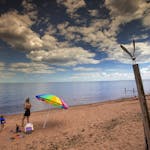Perhaps they shouldn't have risked driving to the Canadian border in such a dilapidated vehicle, but there they were — stuck in the woods with a truck that wouldn't start.
Jim Wynne knew they were too remote for a tow. And as he struggled under the hood with a series of fixes that didn't work, the anger and the cursing surged.
"You just give it too much energy, man," advised Wynne's traveling companion, Takashi Yoshino, who was serenely watching from atop a nearby boulder.
The feedback struck a nerve.
"Now, I want to kill him," Wynne recalled. "I'm throwing things all over. I had to walk away from him because I was so frustrated. And as I walked away to collect myself, I realized: He was so right. … I calmed down, and I did what I needed to do, and I got the vehicle running."
"He always had that peace of mind about him — if you stay calm and you stay relaxed, you can find your way through anything."
Yoshino led hundreds of clients toward recovery through decades of work at chemical dependency treatment centers in the Twin Cities.
He died on Jan. 11 from complications of chronic obstructive pulmonary disease. He was 71. Colleagues and former clients recalled Yoshino's equanimity as he peacefully guided people through the rigors of recovery while also facing significant personal challenges. A cancer diagnosis more than a decade ago brought help from the late New York Times media critic David Carr.
"He was a beacon and a role model for people seeking and achieving early recovery," said Dan Cain, the longtime president of RS Eden, a social services group that includes a treatment center in Minneapolis called Eden House.
Yoshino was born in Minneapolis and attended high school here, after spending some of his childhood in Hawaii. Wynne, his longtime friend and colleague, said they both got into counseling after having been addicts who found sobriety and wanted to help others.
Yoshino found help at Eden House, a center that focuses on clients who often have a history with the criminal justice system and life on the streets. He went on to become a counselor at Eden House for more than a decade, before moving to other treatment centers.
"It's so critical to be able to be empathetic for [the clients], because they don't feel very good about themselves," said Wynne, who currently works at Eden House. "No addict does, but the kind of addict that we work with — it's being reinforced at a societal level, that we're not worthwhile and that we are the problems of society. …
"That was one thing that Tak was so skillful at," Wynne said. "He could make anybody sitting with him feel important. He could make anyone sitting with him feel love."
Carr, who was a longtime journalist in the Twin Cities before working in New York, met Yoshino at Eden House. In his 2008 memoir "The Night of the Gun," Carr wrote about a fishing trip that clients and staff took to the Boundary Waters Canoe Area Wilderness.
"A very rough, remarkably urban crowd was loaded into vans for the long trip from Minneapolis, along with axes, filet knives and handsaws," Carr wrote. " 'What could go wrong?' said Tak, one of the clients who organized the trip, as he surveyed all the lethal hardware."
Carr related a conversation years later when he asked Yoshino whether clients "were just gimped in some fundamental way, or if the drugs created a kind of temporary mania that was now behind us?" Yoshino replied: "We did what we did, and we each brought something to the table when we got involved with chemicals."
Yoshino is survived by his wife, seven children, a sister and a brother. Services have been held.




